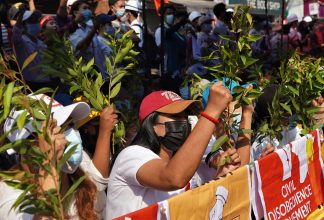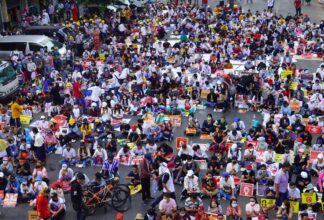Myanmar, Thailand abandoned Rohingya in their time of Need
“Malaysia and Indonesia have agreed to take in ‘boat people’, but ongoing state-sponsored violence and negligence ensure the flood of migrants will go on,” writes Shaivalini Parmar, Myanmar Programme Officer, Civil Rights Defenders, in The Nation on 22 May, 2015.
Earlier this month, more than 26 corpses were exhumed from people-trafficking camps in southern Thailand. A joint military-police operation uncovered the bodies at an abandoned camp in Songkhla province on the Thai-Malaysia border on May 1. It is suspected the victims were Rohingya who starved to death or died of disease while awaiting passage to Malaysia.
Days later, on May 5, a second camp was discovered along with at least two more bodies. The decomposing corpses were found wrapped in blankets in shallow graves. The camps allegedly contained bamboo cages and what appeared to be “torture rooms”.
Over the next few days, more than 1,600 people fleeing Myanmar and Bangladesh were rescued off the coast of Indonesia. It is estimated that thousands more remain stranded at sea, refused entry by countries in the region.
In the past three years, more than 100,000 Rohingya have fled sectarian violence in Myanmar’s Rakhine State, where they have been subjected to a systemic, state-sponsored campaign of violence, abuse and discrimination, leading to a humanitarian crisis. Many have become prey to networks of human-trafficking syndicates that operate between western Myanmar and southern Thailand. And yet, both Thailand and Myanmar have repeatedly failed in their responsibilities to protect a group that is at serious risk.
For years, authorities in Myanmar have deliberately ignored gross human rights violations against the minority Rohingya, in some cases even aiding the abuse. After fleeing communal violence in 2012, many Rohingya remain in displacement camps, fearful of returning to their homes in a state still rocked by incidents of anti-Muslim violence. Though they have lived in Myanmar for generations, the Rohingya have been refused citizenship by the government, effectively rendering them stateless. Last year, the government proposed granting them citizenship on the condition they changed their ethnicity to Bangladeshi. That offer only served as a reminder of how entrenched state-level discrimination is. In February, the government revoked the “white cards” that conferred voting rights on the Rohingya.
The UN Refugee Agency estimates that 25,000 Rohingya and Bangladeshis boarded smugglers’ boats between January and March. Fleeing has only pushed the Rohingya straight into the hands of traffickers, whose trade has generated an estimated US$250 million (Bt837 million) since 2012. State authorities have been complicit, and sometimes even directly involved, in clandestine trafficking operations. The UN has collected testimony from hundreds of Rohingya who escaped traffickers and have recounted stories of captivity, deprivation, torture and other abuse. While the Thai government has been quick to condemn the role of its own officials in people-trafficking and promised to hold those found guilty to account, the problem of complacency and corruption in officialdom is deep-rooted and not easily solved.
In the wake of the discovery of mass graves, and the likelihood that many more will be found, what should change? Rights bodies and the international community have called on the Thai authorities to expedite the investigation and hold perpetrators to account. The Thai government, in turn, has initiated a multilateral dialogue with both Myanmar and Malaysia, a step in the right direction. Still, Bangladesh, Indonesia, Malaysia, Myanmar, Thailand and others need to fully commit to a unified and rights-respecting action plan towards this aim. International actors, including the European Union, need to encourage a regional response from Asean member-states.
Ultimately, the discovery of these mass graves is symptomatic of a broader crisis in Myanmar, which demands unified action from regional powers. Without a firm commitment towards ending state-sponsored violence against the Rohingya, there can be no resolution. Key to this is amending the discriminatory 1982 citizenship law in Myanmar, which doesn’t recognise the Rohingya as full citizens and thereby restricts their access to services including health and education while also denying them the basic right to freedom of movement. Further to this, Myanmar’s government should hold an impartial investigation into all allegations of violence and hold perpetrators to account, an initiative that could involve the UN and other actors. Myanmar should revise legislation to fully protect the Rohingya and other minorities from further violence and discrimination.
The international community must awaken now, grasp the urgency of the Rohingya’s plight and do more. How many more mass graves need to be uncovered before we ensure accountability from the government of Myanmar, and put an end to systemic abuses against a recognised vulnerable population?
In the face of optimism over a new and “reformed” Myanmar, the Rohingya crisis is a clear reminder that there is still a long way to go before this country meets international humanitarian standards.

